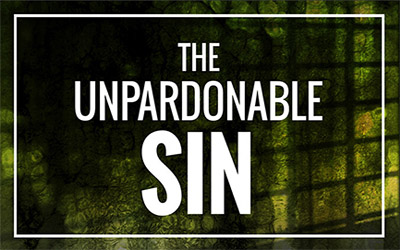Blasphemy Against the Holy Spirit
What exactly is this sin?
(Bấm vào đây để đọc tiếng Việt)
 “22Then they brought to him a demon-possessed man who was blind and mute. Jesus healed him so that he could speak and see. 23All the crowds were amazed and said, “Could this one be the Son of David?” 24But when the Pharisees heard this they said, “He does not cast out demons except by the power of Beelzebub, the ruler of demons!” ... 31For this reason I tell you, people will be forgiven for every sin and blasphemy, but the blasphemy against the Spirit will not be forgiven. 32Whoever speaks a word against the Son of Man will be forgiven. But whoever speaks against the Holy Spirit will not be forgiven, either in this age or in the age to come. (Matthew 12:22-32)”
“22Then they brought to him a demon-possessed man who was blind and mute. Jesus healed him so that he could speak and see. 23All the crowds were amazed and said, “Could this one be the Son of David?” 24But when the Pharisees heard this they said, “He does not cast out demons except by the power of Beelzebub, the ruler of demons!” ... 31For this reason I tell you, people will be forgiven for every sin and blasphemy, but the blasphemy against the Spirit will not be forgiven. 32Whoever speaks a word against the Son of Man will be forgiven. But whoever speaks against the Holy Spirit will not be forgiven, either in this age or in the age to come. (Matthew 12:22-32)”
What are your thoughts after reading the above verse or hearing a sermon on its meaning and applications? Most people believe that to “blaspheme” is to use foul language or disrespectful words.
BLASPHEMY AGAINST THE HOLY SPIRIT
Many people believe that blasphemy against the Holy Spirit is related to attributing God’s miracle to the devil after reading the passage above. This assumption, however, will cause problems for those who want to question the signs and wonders they see. In Matthew
24:24, Jesus warns us about this potential problem:
“For false messiahs and false prophets will appear and perform great signs and wonders to deceive, if possible, even the elect.”
Who will dare to question the authenticity of the false prophets’ signs and wonders if they are so real that they can even deceive the saved, and they are afraid of committing blasphemy against the Holy Spirit?
JESUS IS CHARGED WITH BLASPHEMY
We should be thankful that there is a Biblical example of the “blasphemy” accusation so that we can use it as a model to interpret its use in Matthew 12:22-32.
It is written as follows in John 10:30-33:
“25Jesus replied, “ … The Father and I are one. 31The Jewish leaders picked up rocks again to stone him to death. 32Jesus said to them, “I have shown you many good deeds from the Father. For which one of them are you going to stone me?” 33The Jewish leaders replied, “We are not going to stone you for a good deed but for blasphemy, because you, a man, are claiming to be God.”
The term “blasphemy,” which is translated from the Greek word βλασφημία, is used in both Matthew 12:31 and John 10:33. In John 10:33, the Jewish leaders accused Jesus of “blasphemy” because he was “a man claiming to be God.” As a result, someone claiming to be the Holy Spirit must commit blasphemy against the Holy Spirit. We can broaden its meaning to include anyone who takes on the role of the Holy Spirit, stands in his place to perform a specific function, claims to have the same power as him, or does something similar.
THE TRUE MEANING OF THIS SIN
Most Christians agree that the Holy Spirit serves as an intercessor, a seal of redemption, to lead them into all truth, to give eternal life (just as God gave Adam his spirit so he could become a living being), a comforter, one who convicts the world of sin, one who communicates God’s will to believers, one who bestows wisdom, one who bestows gifts, one who bears fruit, and so on.
As a result, blasphemy against the Holy Spirit must be committed by someone or a system of belief that attempts to play the role of the Holy Spirit.
WHO CAN COMMIT THIS SIN?
In fact, there are numerous ways for someone to attempt to play the role of the Holy Spirit. There are already many religious leaders with large followings appearing in churches all over the world. They also spread many false beliefs, which may cause believers to abandon the faith they once held. As a result, it is critical for believers to be deeply rooted in the gospel of grace of the Lord Jesus Christ in order to recognize false teachers or false beliefs when they appear.
However, most of the Pauline letters, in my opinion, show that the most difficult issue for believers is the ability to distinguish between law and grace, faith and works. Jesus used many parables to inform us of these differences ahead of time, but they remained hidden until revealed to Paul so that he could explain them to us in the New Testament.
THE LAW AND THE HOLY SPIRIT
Many passages compare the roles of the law and the Holy Spirit. As an example: “It is the Lord who made us adequate to be servants of a new covenant not based on the letter but on the Spirit, for the letter kills, but the Spirit gives life.” (2 Corinthians 3:6)
The word “letter” in the preceding verse refers to the law.
“For the law of the life-giving Spirit in Christ Jesus has set you free from the law of sin and death.” (Romans 8:2)
“For when we were in the flesh, the sinful desires, aroused by the law, were active in the members of our body to bear fruit for death.” (Romans 7:5)
“But if the ministry that produced death – carved in letters on stone tablets – came with glory, so that the Israelites could not keep their eyes fixed on the face of Moses because of the glory of his face (a glory which was made ineffective) how much more glorious will the ministry of the Spirit be?” (2 Corinthians 3:7)
The phrase “ministry that produced death” was used in the preceding passage to describe Moses’ ministry of delivering the Ten Commandments from Mount Sinai to the Israelites. This ministry was compared to the Holy Spirit’s live giving ministry. The verses above were used to demonstrate that those who rely on the works of the law to live out their Christian lives may have committed the sin of blasphemy against the Holy Spirit.
CONCLUSION
I’d like to finish with the following two verses:
“I do not set aside God’s grace, because if righteousness could come through the law, then Christ died for nothing!” (Galatians 2:21)
“You who are trying to be declared righteous by the law have been alienated from Christ; you have fallen away from grace!” (Galatians 5:4)
The cross of Christ is the focal point of the gospel, but relying on the law to obtain God’s righteousness can render it ineffective. What does this imply? It means that those who rely on the keeping of the law will not be saved. It is the only sin for which there is no forgiveness.
Nghi Nguyen
- Scripture quoted by permission. All scripture quotations, unless otherwise indicated, are taken from the NET Bible® copyright ©1996-2006 by Biblical Studies Press, L.L.C. All rights reserved.
Disclaimer: This is my own opinion on the topic, which does not necessarily reflect the church's theology, or beliefs of the individuals in it — Nghi Nguyen

